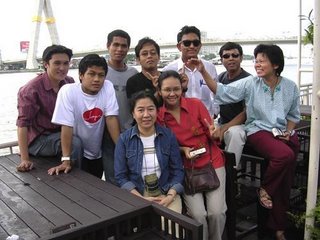Sawasdee again, Bangkok! I'll be leaving Manila for a week starting on Monday to attend the Network Meeting and Organizational Development Training organized by the Southeast Asian Press Alliance (SEAPA). My colleagues at the Center for Media Freedom and Responsibility (CMFR) are going as well: Lara (also to attend the same meeting and workshop), Nathan Lee and Jose Bimbo Santos (who are both going to the Gender/Alerts Training Workshop also organized by SEAPA which will also be happening at the same time as the meeting and workshop I am attending).
 I had fond memories of Bangkok when I was there back in 2004 (when I was the one CMFR sent to attend the first SEAPA Gender/Alerts Training Workshop), and have made friends with some of my colleagues in the region. The photo above shows me together my other colleagues at the 2004 Gender/Alerts Workshop.
I had fond memories of Bangkok when I was there back in 2004 (when I was the one CMFR sent to attend the first SEAPA Gender/Alerts Training Workshop), and have made friends with some of my colleagues in the region. The photo above shows me together my other colleagues at the 2004 Gender/Alerts Workshop.I'm happy to be back there in Thailand!
And uh, the bad news is:
Since I am gone from November 19 to November 26 (including my overnight stay in the office on the 19th), please say goodbye to an occasion I am supposed to have that week. I might have a smaller affair after I get back but I am still not sure yet. To the guys who are expecting that affair, my apologies.
Speaking of good news and bad news. I just remembered a discussion yesterday by the CMFR bosses about this concept of "good news" and "bad news" in the press, with the press trying to look for something to celebrate even as, the country is rife with news and developments that are otherwise hardly encouraging.
Vergel Santos, PJR Reports consulting editor, wrote about the issue in the August 2002 issue of the Philippine Journalism Review. Discussing the merits (or lack thereof) of then Ted Failon's show The Good News, Mr. Santos wrote in his article "Good News, Bad News, Silly News": "News is supposed to be neither good nor bad, but neutral. It is for the customer, not the messenger, to say whether a piece of news is good or bad. And he can judge that only for himself -- good if the news makes him happy, bad if it makes him unhappy."
Mr. Santos added: "Journalism requires that the news be presented uninfluenced by whatever happiness or unhappiness it may bring so as not to engender any false sense of security (as in the case of 'good news') or alarm (as with 'bad news'). Thus, if it happens that the news brings more unhappiness than happiness it is not journalism's fault."





No comments:
Post a Comment